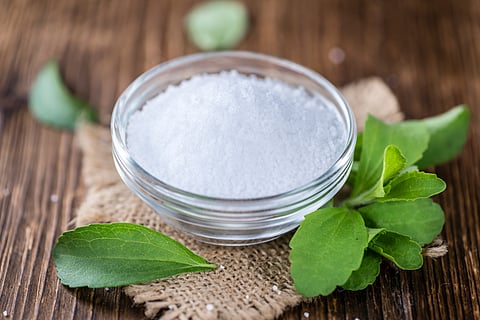
- Home
- EventsEvents
- Product Launches
- CategoriesCategories
- Advertise
- Opinion

Sweetness is a universally beloved taste that has the power to bring joy and satisfaction to our palates. However, excessive sugar consumption has been linked to various health concerns, including obesity, diabetes, and cardiovascular diseases. In response to the growing demand for healthier alternatives, food scientists and researchers are exploring natural sweeteners as substitutes for artificial sugars. These natural sweeteners provide the desired sweetness and offer potential benefits in terms of reduced calorie intake and minimized impact on blood sugar levels.
Natural sweeteners derived from plants or naturally occurring substances are gaining traction as natural substitutes for artificial sugars. As the detrimental effects of excessive sugar consumption become more apparent, consumers are natural options without compromising taste. There has been significant research and development in the field of natural sweeteners. Natural sweeteners allow us to satisfy our sweet tooth while minimizing the negative impact on our health.
Plant-based alternatives:
Plant-based sweeteners have gained popularity due to their natural origins and lower calorie content than traditional sugar. These alternatives offer a sweetness profile similar to sugar while providing minimal impact on blood sugar levels.
Stevia is extracted from the leaves of the Stevia rebaudiana plant. Stevia is a zero-calorie sweetener that is several times sweeter than sugar. It has gained popularity as a natural sugar alternative due to its negligible impact on blood sugar levels. Stevia's sweetness comes from natural compounds called steviol glycosides.
Monk Fruit Extract is derived from Monk fruit; this sweetener contains natural compounds called mogrosides that provide sweetness without adding calories or affecting blood sugar levels. Monk fruit extract offers a clean, sugar-like taste and is becoming popular as a natural sugar substitute.
Allulose is found naturally in small quantities in certain fruits. Allulose is a low-calorie sweetener that provides approximately 70% of the sweetness of sugar. It offers a similar taste profile and functionality to sugar but significantly fewer calories. Allulose has gained attention for its ability to contribute to the reduction of added sugars in food products.
Erythritol is a sugar alcohol found naturally in some fruits and fermented foods. It provides sweetness without contributing calories and has a similar taste to sugar. It is well-tolerated by most individuals and does not significantly impact blood sugar levels. Erythritol is commonly used as a sugar substitute in various food and beverage products.
Benefits and considerations
One of the primary advantages of natural sweeteners is their minimal impact on blood sugar levels, making them suitable for individuals with diabetes or those aiming to reduce sugar intake. Stevia, monk fruit extract, allulose, and erythritol have low glycaemic indexes and do not cause the same blood sugar spikes as regular sugar. These sweeteners are often low in calories or calorie-free, aiding weight management efforts. They offer a viable solution for those seeking to satisfy their sweet cravings without compromising their health goals.
Moreover, natural sweeteners are generally considered safe and are not associated with the potential health risks of artificial sweeteners. As they are derived from natural sources, they often undergo less processing than artificial sugars, aligning with the growing consumer demand for minimally processed food options. Unlike artificial sweeteners, natural sweeteners can provide a more satisfying and authentic taste experience, resembling the flavor of sugar without the same caloric content.
However, it is essential to note that each natural sweetener may have its considerations. Some individuals may experience a mild aftertaste with certain sweeteners, particularly stevia and monk fruit extract. Additionally, excessive consumption of certain sugar alcohols, such as erythritol, can lead to digestive issues for some individuals. Consuming natural sweeteners in moderation and being mindful of personal sensitivities is recommended.
Usage and availability
Natural sweeteners can be used as substitutes for sugar in various applications, including beverages, baked goods, and condiments. They can be found in granules, powders, or liquid extracts, providing flexibility in their usage. It is essential to follow specific guidelines provided by manufacturers to achieve the desired sweetness when substituting natural sweeteners for sugar in recipes. Conversion charts are often available to help determine the appropriate amount of sweetener.
Natural sweeteners have gained widespread availability in recent years, with many being readily found in grocery stores, health food stores, and online platforms. As their popularity continues to rise, the range of available products is expected to expand, providing consumers with more options for incorporating natural sweetness into their diets.
Market outlook and future perspectives
The market for natural sweeteners is projected to witness significant growth in the coming years. As consumers continue to seek healthier alternatives, food and beverage manufacturers are investing in research and development to incorporate natural sweeteners into their products. The ability to offer reduced-sugar or sugar-free options while maintaining taste appeal has become crucial for companies to meet consumer demands.
Furthermore, ongoing research is focused on improving the taste profiles of natural sweeteners, enhancing their stability during food processing, and exploring the potential synergies between different natural sweeteners.
As the demand for healthier sweetening options increases, natural sweeteners have emerged as attractive alternatives to artificial sugars. Stevia, monk fruit extract, allulose, and erythritol are among the natural sweeteners gaining popularity due to their minimal impact on blood sugar levels and potential health benefits. While natural sweeteners offer promising alternatives, it is essential to consider individual preferences and potential sensitivities. Incorporating these novel sweeteners into our diets can allow us to enjoy the pleasures of sweetness while making more informed and health-conscious choices.
Click HERE to subscribe to our FREE Weekly Newsletter
